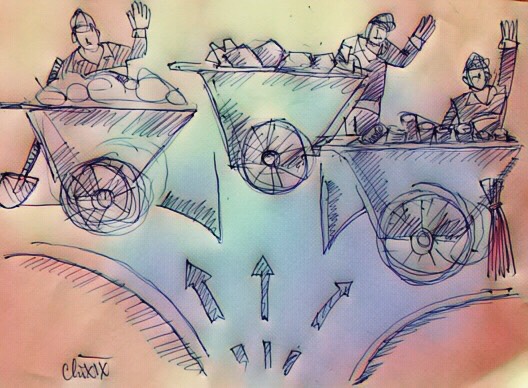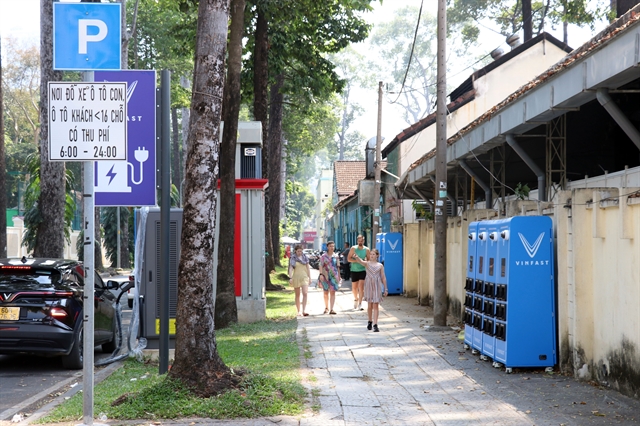 Talk Around Town
Talk Around Town

Despite the many photos, posts and videos that were shared calling for a sustainable lifestyle there are distances between awareness, action and habit.

|
| Illustration by Đàm Minh Chí |
12 years ago, when a television still occupied a central position in every Vietnamese house, I remember myself, a middle school student at the time, muttering along to a catchy song.
“Let us sort waste as it is an invaluable resource. 3R! 3R! 3R! 3R! 3R!”
In the campaign's advertisement promoting sorting rubbish, three women in road sweeper uniforms swing their brooms and dance to a steady beat.
Although the video stuck with me, it seems like not everyone had the same reaction.
More than a decade has passed, yet waste sorting remains a relatively strange concept to most Vietnamese people.
A single wastebasket standing alone on the street is a common sight. Separate bins for recycling are only found at schools or in high-rise buildings and modern urban areas.
And yes, people who really care can sort their garbage, but they will need to find scrap collectors to sell their recyclable items, make compost from organic waste and wait for dustcarts to pick up other trash.
According to Hà Nội authorities, the city generates 60 tonnes of plastic waste each day, costing billions of đồng to treat, all due to the lack of a proper waste sorting system.
Despite the failure of the waste sorting campaign to make a lasting impact, the plastic reduction trend has strengthened in the past year and quickly swept through Việt Nam's social networks.
Walk through the city's streets and you can find young people talking passionately about how harmful plastic products are to the environment and human health, and proposing alternatives.
One of my friends bought a set of steel straws after watching a video of a plastic straw being pulled out of a sea turtle’s bleeding nose on her Facebook newsfeed.
“Since then, a totally normal utensil has turned gross,” she said. “Whenever I go out for a coffee, I always ask the waitress to not give me straws. I will either use mine or sip.”
Last March, #trashtag went viral on Facebook. As part of the campaign, young people worked together to clean up polluted public places and posted before and after pictures online.
In another development, many people have gone to traditional markets trying to convince sellers to reduce their use of plastic bags and switch to banana leaves.
Despite the many photos, posts and videos that were shared calling for a sustainable lifestyle, after the public holiday in May, beaches in coastal provinces including Thanh Hoá and Hà Tĩnh were left choked in trash.
The harsh scenes of pollution show us the distance between awareness, action and habit.
In May, Highlands Coffee, one of the most popular coffee chains in Việt Nam, started offering customers a free upsize if they bring their own containers instead of using the normal single-use cups.
The move came after thousands of netizens signed an online petition asking Highlands to stop using plastic cups, cup holders and spoons for both dine-in and takeaway orders.
The change, however, merely pushes the responsibility to reduce plastic onto customers.
People choose single-use utensils, bottled water and plastic bags not only for their convenience but also for the affordable prices.
A person may join a cleanup, buy reusable utensils or share a video about climate change for fear of missing out or in response to peer pressure. But the less-plastic trend will still vanish after a few months unless there is an effort to sustain it and convert awareness into widespread everyday habits.
Instead of just singing along to an environmental protection ad, you can choose to bring your own cup when you buy takeaway coffee or go out for lunch instead of ordering food online.
These simple changes can be your first steps toward a greener life and could influence others to follow suit.
Reducing plastic is not a just-for-fun kind of trend. It is about our shared future and our home. You have the power to make a change, so do it. VNS




